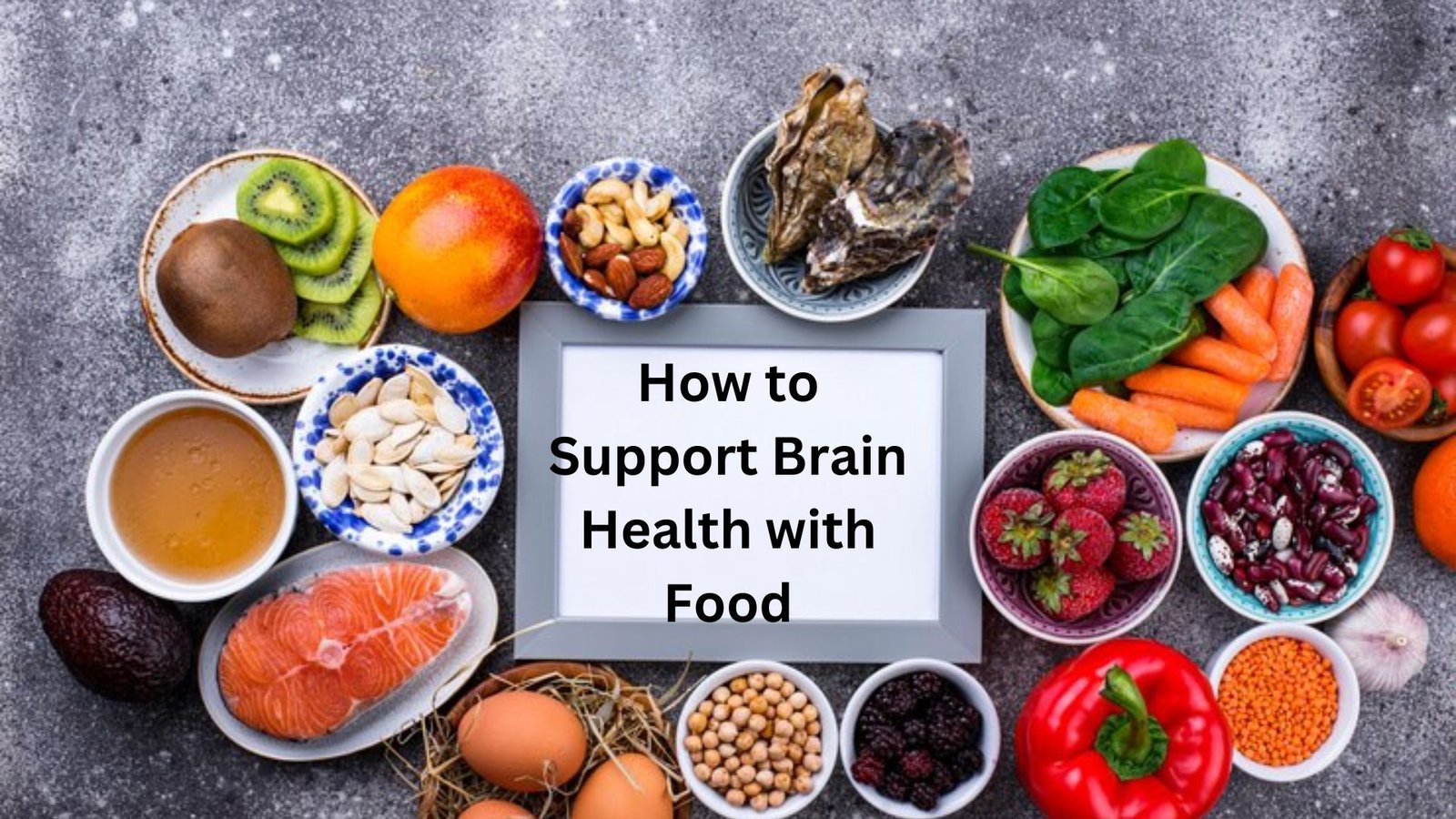Supporting brain health with food is one of the most effective ways to maintain cognitive function, improve memory, and protect against age-related mental decline. The brain, being one of the most energy-demanding organs in the body, requires a variety of nutrients to function optimally. By carefully selecting foods that nourish the brain, you can enhance mental clarity, focus, and overall well-being. This guide will explore the essential nutrients and foods that support brain health, offering actionable tips on how to incorporate them into your daily diet.
The Connection Between Food and Brain Health
Supporting brain health with food is not just about eating a balanced diet, but about prioritizing nutrients that fuel the brain and promote cognitive longevity. A variety of vitamins, minerals, and healthy fats play a vital role in supporting neuroplasticity, protecting against oxidative damage, and reducing inflammation in the brain. Certain foods are packed with compounds that can improve cognitive function, memory, and even mood.
Key Nutrients for Brain Health:
Omega-3 Fatty Acids: Vital for brain cell function and structure.
Antioxidants: Protect brain cells from oxidative stress and aging.
B Vitamins: Essential for energy production and cognitive processes.
Vitamin D: Regulates brain cell communication and mood.
Magnesium: Supports brain plasticity and memory function.
Brain-Boosting Foods to Incorporate Into Your Diet
To support brain health with food, it’s crucial to include nutrient-dense options in your diet. Below are some of the most beneficial foods for brain health.
Fatty Fish
Fatty fish such as salmon, mackerel, and sardines are rich in omega-3 fatty acids, which are essential for maintaining healthy brain cells. Omega-3s are known to support cognitive function, improve memory, and protect against neurodegenerative diseases. Regular consumption of fatty fish can enhance brain health and promote longevity.
Berries
Berries, especially blueberries, are packed with antioxidants like flavonoids, which help combat oxidative stress and inflammation in the brain. These antioxidants improve memory, increase mental clarity, and support cognitive function. Incorporating a variety of berries into your diet can help protect the brain from age-related cognitive decline.
Leafy Greens
Leafy greens such as spinach, kale, and broccoli are loaded with vitamins, minerals, and antioxidants. They contain high amounts of folate, a B vitamin that supports neurotransmitter production and cognitive health. The anti-inflammatory properties of leafy greens help protect brain cells from damage and support overall mental function.
Nuts and Seeds
Nuts and seeds, such as walnuts, almonds, and flaxseeds, are excellent sources of healthy fats, vitamin E, and antioxidants. Walnuts, in particular, are high in omega-3 fatty acids and polyphenols, which can help improve brain function and memory. Including these nutrient-dense foods in your diet can significantly boost brain health.
Avocados
Avocados are rich in healthy monounsaturated fats, which support blood flow to the brain and help maintain brain cell structure. They also contain vitamin K, folate, and vitamin C, which are essential for reducing brain inflammation and supporting cognitive health. Eating avocados regularly can help enhance brain function and memory.
Dark Chocolate
Dark chocolate, particularly varieties with at least 70% cocoa, contains flavonoids, caffeine, and antioxidants that promote brain health. The flavonoids found in dark chocolate can improve blood flow to the brain, enhancing cognitive function and protecting against neurodegeneration. A small piece of dark chocolate can be a delicious and beneficial treat for brain health.
Eggs
Eggs are an excellent source of B vitamins, particularly B6, B12, and folate, which are essential for the synthesis of neurotransmitters that regulate mood and cognitive function. They also contain choline, a nutrient that plays a vital role in memory and brain development. Eating eggs regularly can help improve focus, memory, and overall brain health.
Turmeric
Turmeric, the yellow spice commonly found in curries, contains curcumin, a compound with powerful anti-inflammatory and antioxidant effects. Curcumin has been shown to enhance cognitive function by boosting brain-derived neurotrophic factor (BDNF), a protein that supports the growth of brain cells. Adding turmeric to your meals can improve memory and reduce the risk of cognitive decline.
Green Tea
Green tea is packed with antioxidants, particularly catechins, which support brain health by reducing oxidative stress and inflammation. The caffeine in green tea provides a gentle energy boost, while the amino acid L-theanine promotes relaxation and mental focus. Drinking green tea regularly can improve memory, cognitive performance, and overall brain function.
Lifestyle Practices to Support Brain Health
Supporting brain health with food is just one part of the equation. A healthy lifestyle that includes physical activity, quality sleep, and stress management is also essential for optimal brain function. Here are a few lifestyle habits to consider incorporating into your routine.
Regular Exercise
Physical activity increases blood flow to the brain and promotes the release of brain-derived neurotrophic factor (BDNF), which supports brain cell growth and cognitive function. Exercise has been shown to improve memory, focus, and overall brain health. Activities such as walking, swimming, or strength training can have significant benefits for the brain.
Quality Sleep
Sleep plays a crucial role in brain health. During sleep, the brain consolidates memories, processes emotions, and removes toxins that accumulate during the day. A lack of sleep can impair cognitive function, affect memory, and reduce emotional resilience. Aim for 7-9 hours of sleep each night to support brain health.
Stress Management
Chronic stress can negatively impact brain health, impair memory, and increase the risk of neurodegenerative diseases. To manage stress effectively, practice relaxation techniques such as meditation, yoga, or deep breathing exercises. These methods can help reduce cortisol levels and protect the brain from the adverse effects of stress.
Conclusion
Supporting brain health with food is a proactive and enjoyable way to enhance cognitive function, improve memory, and protect against cognitive decline. By incorporating nutrient-rich foods like fatty fish, berries, leafy greens, and nuts into your daily diet, you can provide your brain with the essential nutrients it needs to perform at its best. In addition to a brain-healthy diet, adopting a lifestyle that includes regular exercise, quality sleep, and stress management practices will further contribute to maintaining mental clarity and focus. Start nourishing your brain today, and you’ll be able to support cognitive function and overall brain health for years to come.
ALSO READ:What Are the Benefits of Intermittent Fasting?
FAQs
What are the best foods to support brain health?
Foods like fatty fish, berries, leafy greens, nuts, seeds, avocados, dark chocolate, eggs, and turmeric are among the best choices for supporting brain health. These foods provide essential nutrients such as omega-3 fatty acids, antioxidants, and vitamins that protect and enhance brain function.
Can certain foods improve memory?
Yes, foods rich in antioxidants, omega-3 fatty acids, and B vitamins, such as fatty fish, berries, and leafy greens, have been shown to improve memory and cognitive function. Regular consumption of these foods can support long-term brain health and memory retention.
How does diet impact brain function?
Diet plays a crucial role in providing the nutrients needed to fuel the brain. Nutrient-rich foods help protect against oxidative stress, inflammation, and cognitive decline, all of which can negatively impact brain function. A healthy diet supports memory, focus, and overall cognitive performance.
Are there any supplements for brain health?
While whole foods are the best source of nutrients for brain health, certain supplements like omega-3 fatty acids, vitamin D, and B vitamins can support brain function. Always consult with a healthcare provider before taking supplements to ensure they are safe and effective for your needs.
Can diet prevent Alzheimer’s disease?
While no diet can guarantee the prevention of Alzheimer’s disease, a nutrient-dense diet that includes omega-3 fatty acids, antioxidants, and brain-boosting vitamins may help reduce the risk of cognitive decline and protect against neurodegenerative diseases. A combination of diet, exercise, and mental stimulation can support brain health.











